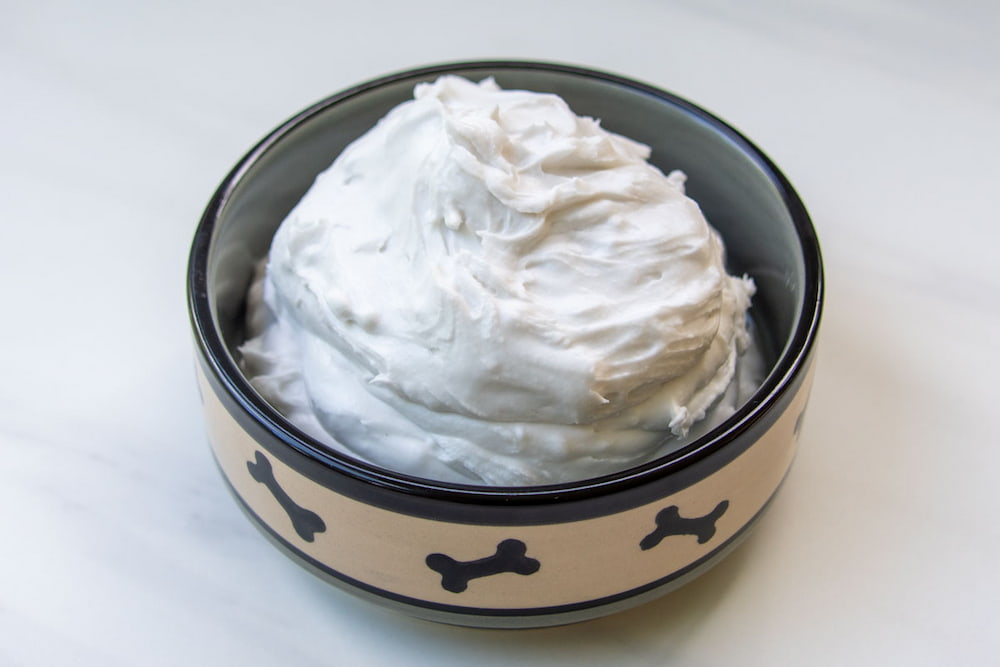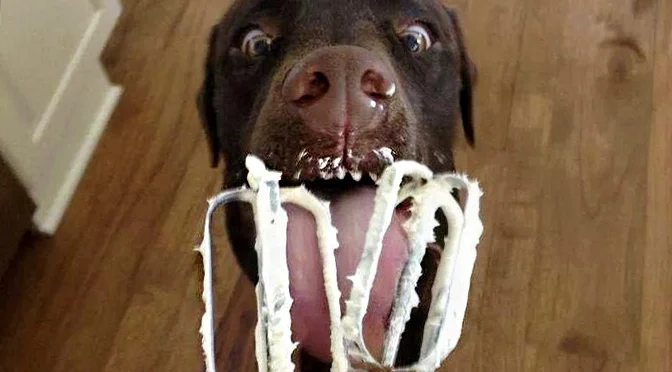
Is Whip Cream Bad for Dogs? Can Dogs Eat Whipped Cream?
Is whip cream bad for dogs? NO! In moderation, dogs can EAT plain whipped cream with no worries. Like humans, not all dogs can easily digest dairy products. Getting that puppuccino at your next drive-through Starbucks run is not a good idea if your dog is lactose intolerant.
That Starbucks puppuccino secret menu item is safe to give as a treat on occasion if your dog can digest dairy products without any issues.
For more specific information, keep reading.
Table of Contents
What’s in Whipped Cream?
Looking at the ingredients is crucial before we can determine whether or not whipped cream is a good treat for dogs. First off, whipped cream is, well, cream that’s been “whipped” into its tasty, fluffy state. For flavor, flavorings like sugar, vanilla, and others are added.
Whipped toppings, such as Cool Whip or Reddi-wip, contain ingredients to keep the delicate cream fresher than a trip from your kitchen to the dining room table. However, these whipped toppings shouldn’t contain anything specifically harmful to dogs. The same holds true for whipped toppings made from coconut, soy, or almonds, which are dairy-free substitutes for the dessert garnish.
Is Whip Cream Bad for Dogs?
Although whipped cream is not inherently toxic to dogs, your particular dog may not be able to tolerate it or other dairy products.
Whipping cream and other dairy products are generally well tolerated by some dogs, but they may experience vomiting, diarrhea, or gas in others.
Yes, dogs can experience lactose intolerance just like people do. How do you know if your dog cannot tolerate lactose? whenever you give the dog enough whipped cream to make their stomach upset.
Overdosing on whipped cream poses the biggest risks for dogs. Treats of any kind, or a daily dose of the fluffy stuff, can add too many calories to a healthy diet and cause your favorite dog to gain unneeded weight.
Therefore, while it shouldn’t be consumed regularly, a small amount of whipped cream is probably acceptable as a treat.
What About Other Starbucks Snacks?
If you want to know if you can share a different Starbucks treat or pastry with your dog, Dr. You can share a nibble without risk, according to Liff, but not much more!) of most With your dog, you can order from the Starbucks menu as long as there are no grapes, raisins, or chocolate components. Dogs adore those egg white bites, according to reliable sources.
Long story short: When it comes to serving your pup delicious “human food”, moderation is the name of the game.

How to Know If My Dog is Lactose Intolerant?
The most frequently reported food allergies in dogs, according to Cummings Veterinary Medical Center at Tufts University, are to chicken, beef, dairy products, and eggs (fun fact: allergies to grains and gluten are actually quite uncommon).
Signs of lactose intolerance in dogs include:
- diarrhea
- vomiting
- bloating
- stomach pain
- excessive gas
Similar to humans, dogs with lactose intolerance are unable to produce lactase, a natural enzyme that works to break down lactose to make it digestible.
Not all dairy products should be avoided just because a dog has digestive problems or is lactose intolerant. Considering that lactose is not present in all dairy products. For instance, cheddar cheese has almost no lactose and is safe for most puppies to eat without causing any negative effects.
What About Non-dairy Whipped Topping?
If you’re making a puppuccino at home, you might believe that a dollop of Cool Whip would be a better choice for your dog than full-fat heavy whipped cream.
You’d be dead wrong.
The artificial sweetener xylitol, which is present in Cool Whip and toxic to dogs, is used in the product. Large doses can result in seizures, vomiting, and diarrhea, as well as a drop in blood sugar that may be dangerous. Probably won’t harm your dog, but why take the chance? A few licks or the occasional spoonful. Keep treats containing xylitol (like most peanut butter, many puddings, and a wide array of “sugar-free” products) off the menu.
Whipped Treats for Lactose-Intolerant Doggos
Not every dog is able to sip from their preferred pup cup at their neighborhood coffee shop. Fortunately, coconut milk can be used to make homemade coconut whipped cream for dog owners. Due to its lack of dairy, coconut whipped cream is suitable for dogs who are lactose intolerant.
You can relax knowing that a homemade dollop of coconut whipped cream won’t upset your dog’s stomach if he has dairy-related health issues. Peanut butter is always an option if that doesn’t work out.
How to Feed Whipped Cream to Dogs?
It’s simple and obvious to feed whipped cream to your dog, whether it comes from a tub of Cool Whip, a pressurized can, or your kitchen. We advise using it as an occasional reward for good behavior in dogs that enjoy its sweet and fatty taste and airy texture.
Whipping cream can be an effective training aid because many dogs have strong food-motivation.

How Much Whipped Cream Should I Feed My Dog?
Whipping cream is one example of a food with low nutritional value that should only be given to your dog occasionally and in small amounts. Giving your dog a portion of whipped cream no bigger than one of their paws is a good general rule of thumb.
The amount of whip cream your dog consumes can quickly add up due to its light texture. 14 grams of fat are required daily for a medium-sized dog weighing about 30 pounds. Just over 13 grams of fat are contained in one cup of pressurized whipped cream from a can, which is almost the daily maximum for your dog. A seemingly harmless treat may suddenly start to have a negative impact on your health if you do it often enough. Keep this in mind before you head to the drive-in for a “puppicino” at your local coffee shop.
Final Words
Whipping cream has little to no health benefits for your dog, despite being a common dessert topping and an ingredient in many holiday dishes all year long. If you’re thinking about giving whipped cream to your dog as a treat, keep in mind that it’s best kept as an infrequent treat and should only be given to dogs whose digestive systems are known to be able to handle milk products due to its high fat and sugar content and lack of vitamins and minerals.
Please post a question in the comments if you have any.
Regarding your reading, I thank you.
Read about Can Dog Drink Milk?




